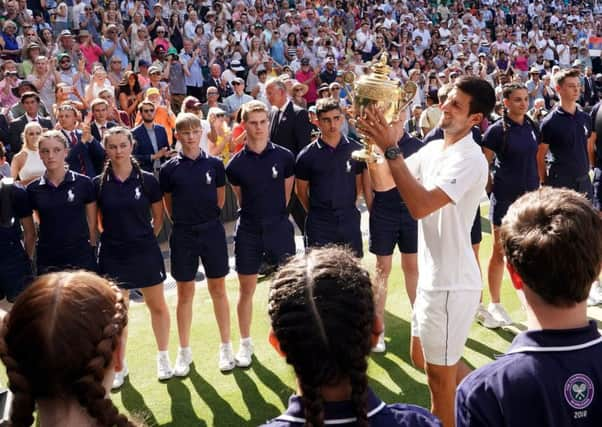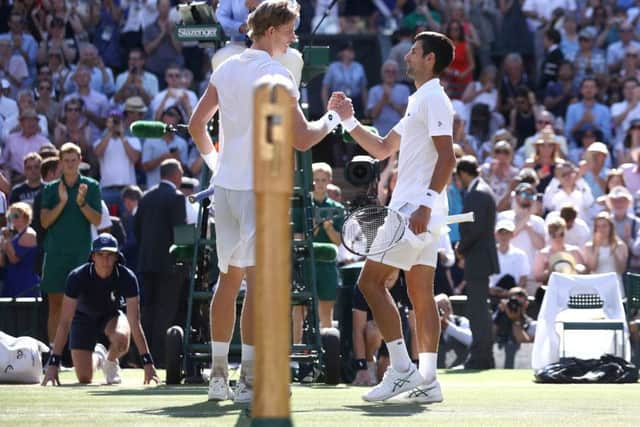Wimbledon: Novak Djokovic back on top after turbulent interlude


The Serbian defeated Kevin Anderson 6-2 6-2 7-6 (7/3) to win his fourth Wimbledon crown, but first grand slam title since the French Open in 2016, which proved to be a dramatic turning point in his career.
From holding all four slam titles Djokovic lost motivation, form and confidence before being forced to take six months off at the end of last season when elbow problems struck.
Advertisement
Hide AdAdvertisement
Hide AdThe 31-year-old said: “There were several moments where I was frustrated and questioning whether I can get back on the desired level or not. But that makes this whole journey even more special for me.


“It’s easy to talk now and look back at it and be kind of grateful, but I really am grateful to go through these kind of mixed emotions, turbulence, as well mentally, moments of doubt and disappointment and frustration, anger.
“It’s a learning curve, it really is. It helped me, not just as a tennis player, but as a human being. It’s usually in a struggle that you get to know yourself, you get to have an opportunity to rise like a phoenix and evolve and get better.”
Djokovic returned to the tour at the Australian Open in January, but his elbow was still hurting and in February he was forced to accept he needed to undergo surgery.
Advertisement
Hide AdAdvertisement
Hide AdComing back in Indian Wells only a few weeks later proved a mistake with Djokovic a shadow of the player and competitor who dominated the tour for long spells between 2011 and 2016.
But, after splitting from coach Andre Agassi and reuniting with mentor Marian Vajda, Djokovic gradually began to look more like his old self.
There were signs on clay, but it was not until this tournament, and especially in his epic semi-final victory over Rafael Nadal, that there became no doubt the real Djokovic was back.
He said, after taking a now-trademark taste of Wimbledon’s grass: “I couldn’t pick a better place in the tennis world to peak and to make a comeback. Wimbledon has been always a very special tournament to me. I dreamed of winning it when I was a seven-year-old boy. I made a lot of improvised Wimbledon trophies from different materials.
Advertisement
Hide AdAdvertisement
Hide Ad“It’s really hard to compare this year’s victory and trophy with any of the other three because they’re all special.
“But if I can pick one that would be probably the first one and this year winning because my son was at the trophy ceremony, which made it extra special.”
Wimbledon do not allow children under five to watch matches in Centre Court, but three-year-old Stefan was brought into Djokovic’s box for the trophy ceremony and shouted excitedly as his father walked over to do a BBC interview.
“I was visualising, imagining this moment of him coming to the stands, cherishing this moment with my wife and me and everyone,” said Djokovic.
Advertisement
Hide AdAdvertisement
Hide Ad“There are special rules here so we have to respect them. He was not there until the very moment when I was walking to get an interview. That was just a moment that I will carry inside of my heart forever.”
Anderson was playing in his second slam final in less than a year after losing to Rafael Nadal at the US Open last summer.
The 32-year-old South African, a late bloomer as a grand slam challenger, is learning the same lesson as many of his contemporaries: if one of the big fish does not get you, another one probably will. Of the last 46 slams, all but eight have been won by Djokovic, Nadal or Roger Federer.
A career-best victory over Federer in the quarter-finals followed by an epic semi-final against John Isner kept Anderson on court for nearly 11 hours so it was no surprise that he was not as his best to start with.
Advertisement
Hide AdAdvertisement
Hide AdBut he made a real fight of it in the third set where he held five set points.
Anderson, who will rise to a career-high of No 5 in the world rankings, said: “It was a tough start for me. You always have high hopes.
“I was hoping to draw on some previous experiences, playing at the US Open in the final, obviously playing Federer a couple days ago.
“But I didn’t really find my form the way I wanted to. Of course, my body didn’t feel great, but I was definitely quite nervous starting out the match. I tried my best to keep at it.
Advertisement
Hide AdAdvertisement
Hide Ad“I definitely felt much better in the third set. I thought I had quite a few opportunities to win that third set.
“I would have loved to have pushed it to another set, but it obviously wasn’t meant to be.”
Barry Davies said it had “been a lot of fun” as he brought his commentary career to an end at Wimbledon. The 80-year-old called the mixed doubles final featuring Jamie Murray and Victoria Azarenka before leaving the BBC’s Centre Court booth for the last time.
Davies worked at ITV before joining the BBC in 1969 and his voice became one of the most distinctive in sport.
Advertisement
Hide AdAdvertisement
Hide AdDavies covered a host of World Cups and Olympic Games while also being a lead commentator for many years at Wimbledon.
He was joined by Australian Liz Smylie on his final job and, after the mixed doubles reached its conclusion and the trophy presentations had taken place, he offered his farewell.
Davies said: “Still plenty of people around the grounds, but it’s time for us to say goodbye from Wimbledon 2018 and for me to say goodbye.”
“We will miss you Barry,” said Smylie, a former Wimbledon doubles champion.
“I will miss you too,” said Davies. “Don’t be a stranger. Come back and visit,” Smylie responded.